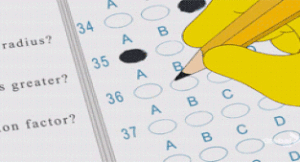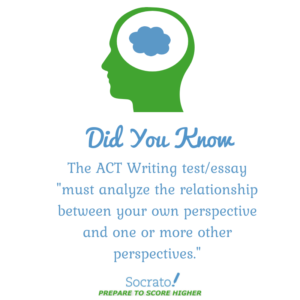“Have something to say, and say it as clearly as you can. That is the only secret of style.”
– Matthew Arnold

Two Important Notes before you appear for the ACT Writing Test !
Before you spend your valuable time preparing for the ACT Writing Test (Essay), you should make sure that the schools you’re applying to will require you to submit an ACT Writing score (the ACT Writing score is the essay score). The ACT Writing test is an optional part of the ACT. Some schools don’t require an ACT Writing score; some schools recommend you submit, but don’t require it; some schools require it. If you’re not sure whether your target schools will require you to submit an ACT Writing score, contact them directly to find out. There’s no reason to prepare for the ACT Essay if you aren’t going to submit the ACT Writing score to anybody.
It’s also important for us to clear something up about the scoring of the ACT Essay. Your final score on the ACT Essay will be on a scale of 2 to 12, but each individual grader who reviews your ACT Essay will give you a score from 1 to 6, and those scores will ultimately be combined to arrive at your final score on the 12-point scale. This means a perfect overall score on the ACT Writing test is 12, but each grader can only give a maximum score of 6. For some reason, the sample essays that appear on pages 123 to 139 of the Red Book are discussed as though they were only reviewed by one grader and given a score out of 6. So keep in mind that a perfect ACT Writing score is a 12 out of 12, but the Red Book sometimes refers to it as a 6 out of 6.
Overview And Important Reminders For The ACT Essay
At this point, you probably won’t be shocked to learn that the ACT Essay has very little in common with the essays you normally write in school—after all, nothing else on the ACT is the same as what we do in school.
Let’s take a minute to understand why the ACT Essay is so different from a school essay.
Before moving forward, register for our demo class now.
One of the most important differences between the two essays is that the person who grades your ACT essay will spend far less time on it than your teachers spend on your school essays. This is because ACT Essay-graders have to evaluate a much larger number of essays, and they have to do it in a standardized, repetitive, reliable way. (Remember that the results of the ACT must be standardised to be valuable, and that goes for the ACT essay just as much as it does for the multiple-choice sections.)

It has a standardised testing method
What does that mean? For one thing, graders can’t spend any time confirming any factual claims you make in your essay. Since it isn’t possible to evaluate all the factual claims in the nearly 2 million ACT essays written each year, and since all the essays have to be held to the same standard, the ACT graders can’t evaluate ANY of the factual claims made in ANY of the essays they grade—that’s the only way to treat all factual claims equally in the grading process.
That means you don’t have to worry about being penalized for saying something that’s factually incorrect on your ACT essay. In other words, your essay could be completely full of factual errors, and the grader wouldn’t be allowed to penalise you for it.

ACT Writing Test analyses
On the other hand, if you wrote an essay for history class and it contained factual errors, your teacher would certainly penalize you.
For similar reasons, you shouldn’t try to amuse or inform the reader of your ACT Essay; nor should you try to do anything else creative. Your grader isn’t going to be sitting in a cafe, having a leisurely look over your paper for an hour or so while drinking a latte and contemplating life. Instead, she’ll read your essay in a minute or so, with the goal of identifying key features of your essay that indicate which score it should receive, based on her training. So you really won’t have an opportunity to write an essay that stands out from the others in a positive way, as you might try to do with an admissions essay or a scholarship essay. On the contrary, you want your essay to blend in with all the other top-scoring essays by imitating the characteristics that all of those essays have (which is what you’ll learn about in this section of this Black Book, of course).
We may not be used to thinking about essay tests in terms of rules. The processes involved in writing and grading essays might seem like they’re too subjective for that. But we know the ACT Essay must follow regular, predictable rules in order to be part of a standardized test.
But those regular, predictable rules are probably not the rules you’d expect—for one thing, the actual characteristics of top-scoring ACT Essays don’t really reflect the Red Book’s guidelines for the ACT essay. ACT, Inc. doesn’t just come out and say, “Well, we’re going to have a lot of essays to grade, so yours probably won’t be looked at for more than a couple of minutes. A couple of overworked essay graders are going to read it once each really quickly and assign it a score based on a few key things like length, and then move on. Just make the essay more than two pages long and do a couple of other things, and you should score high.” Instead, the Red Book says things like, “the ACT Writing Test is designed to measure . . . those writing skills taught in rigorous high school English and writing classes and expected of students entering first-year college composition courses.”
So what should you do?
I recommend you approach this part of the test the same way we’ve approached every other part of the test: by exploiting the standardized nature of the ACT and doing the things that are consistently rewarded on this section, instead of believing what ACT, Inc. claims the section is about.
This section of this Black Book will teach you the unwritten rules of the ACT Essay, and then it will show you how those rules apply to real student essays that appear in the Red Book.
Unwritten Test Design Rules Of The ACT Essay (ACT Writing Test)
Click to know more about ACT Tips.

Recent Comments